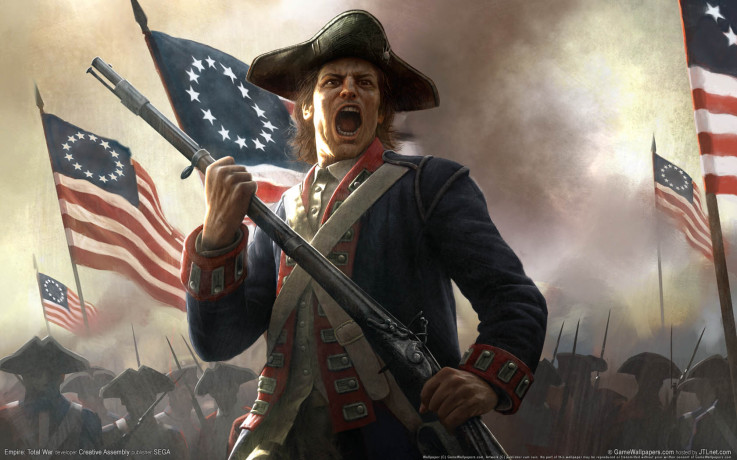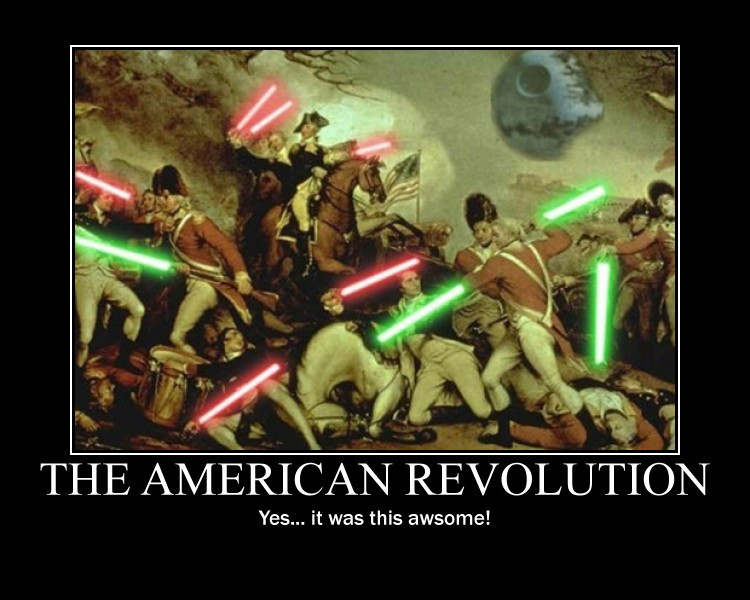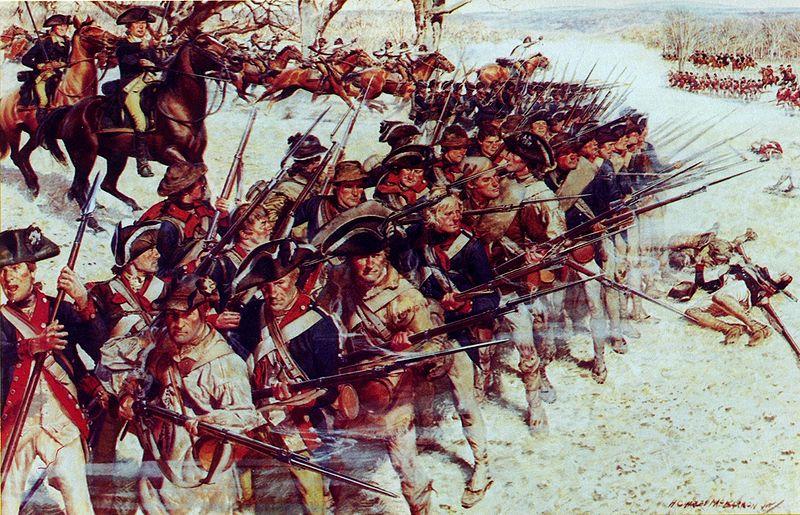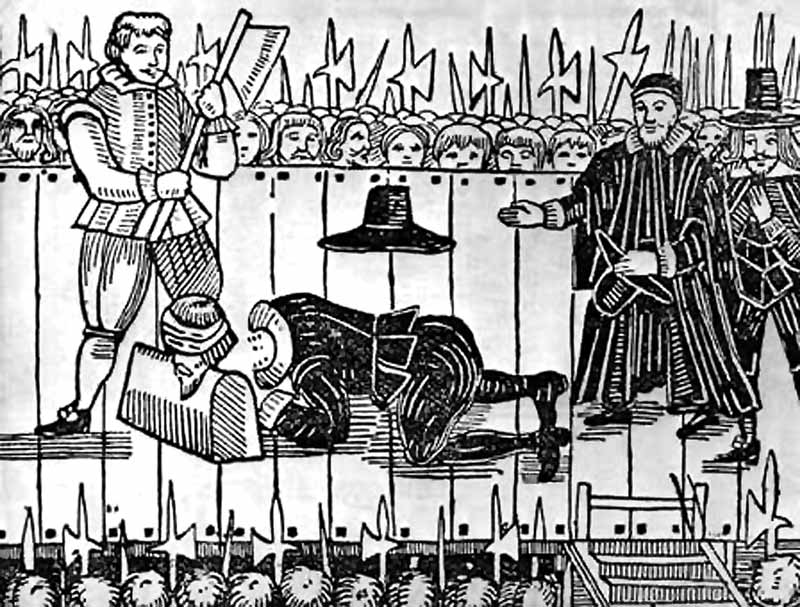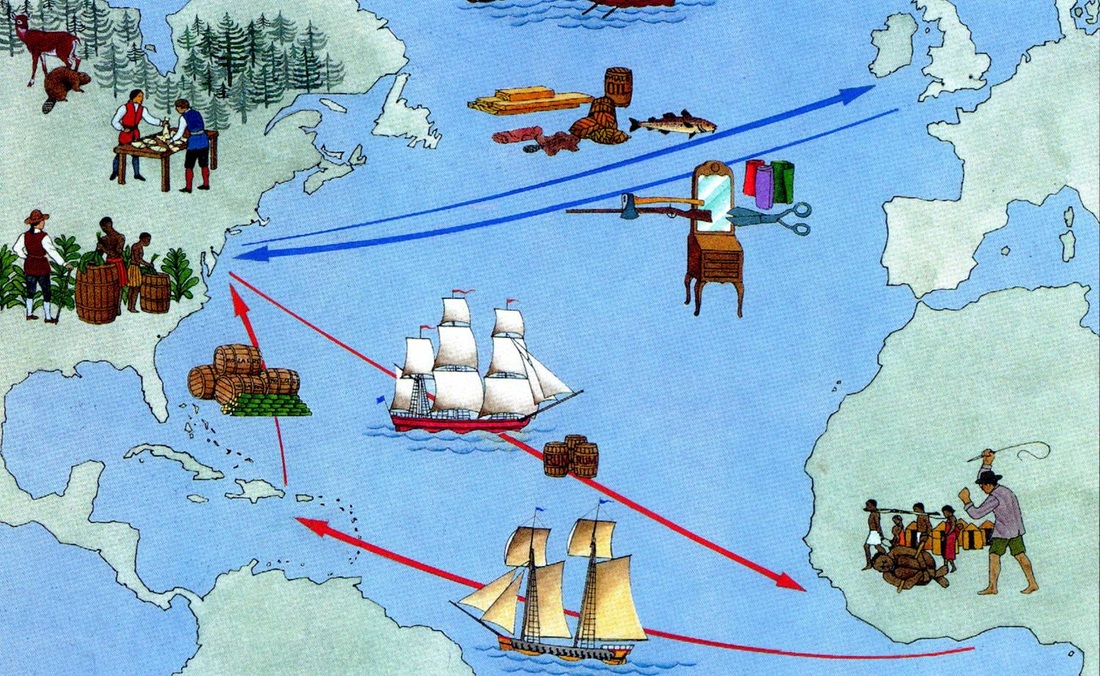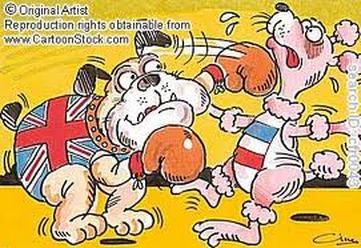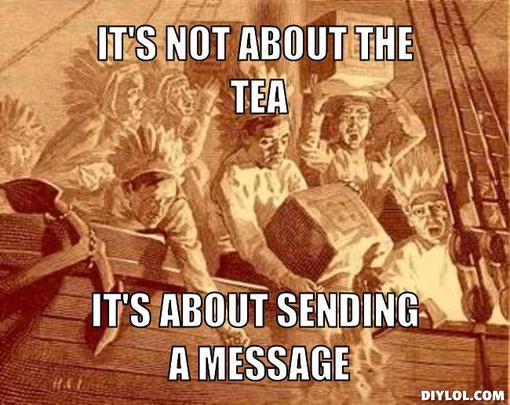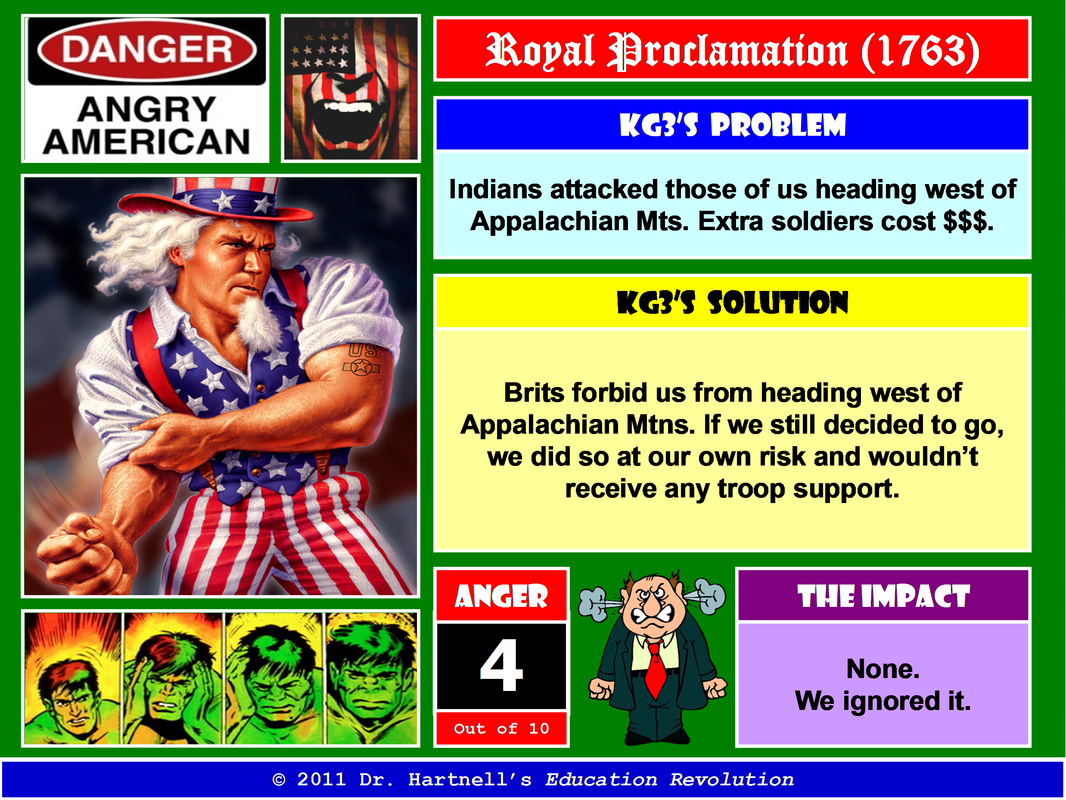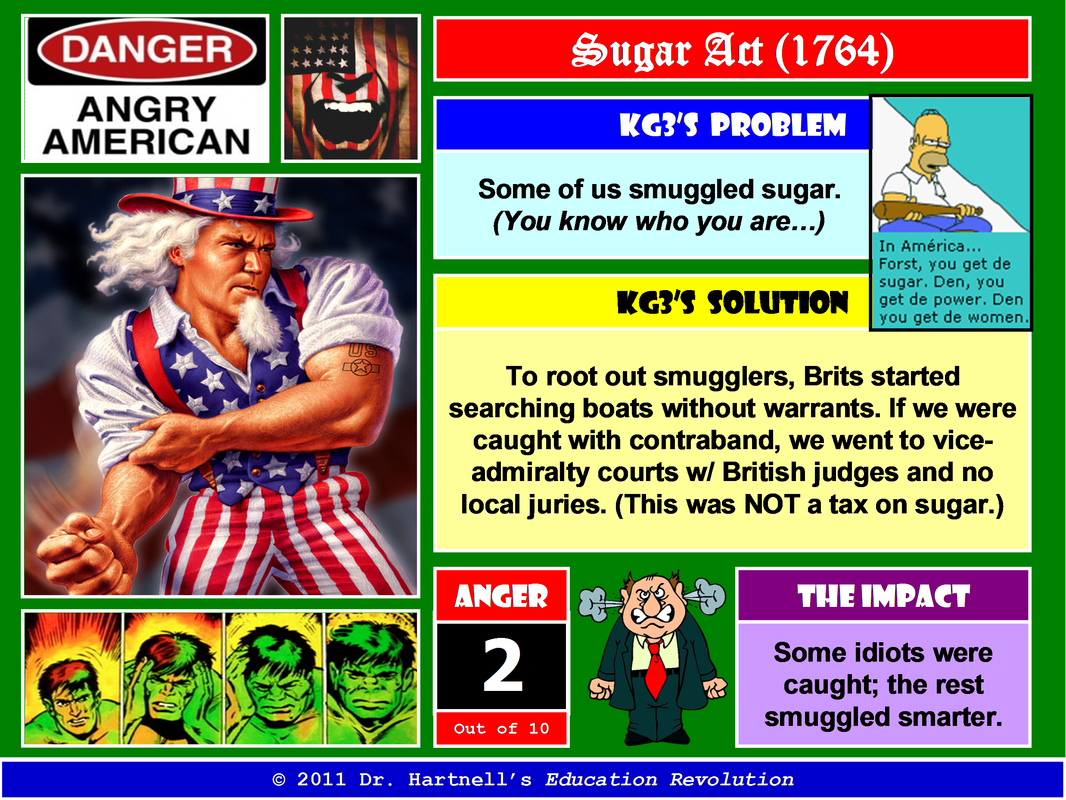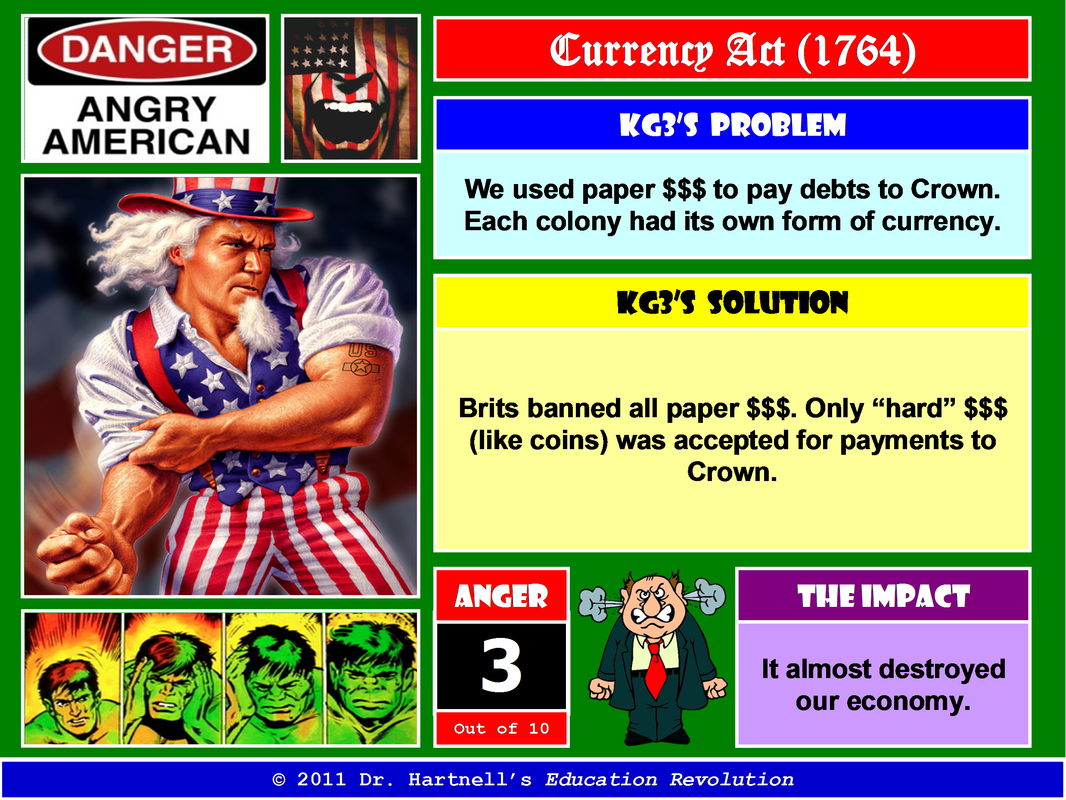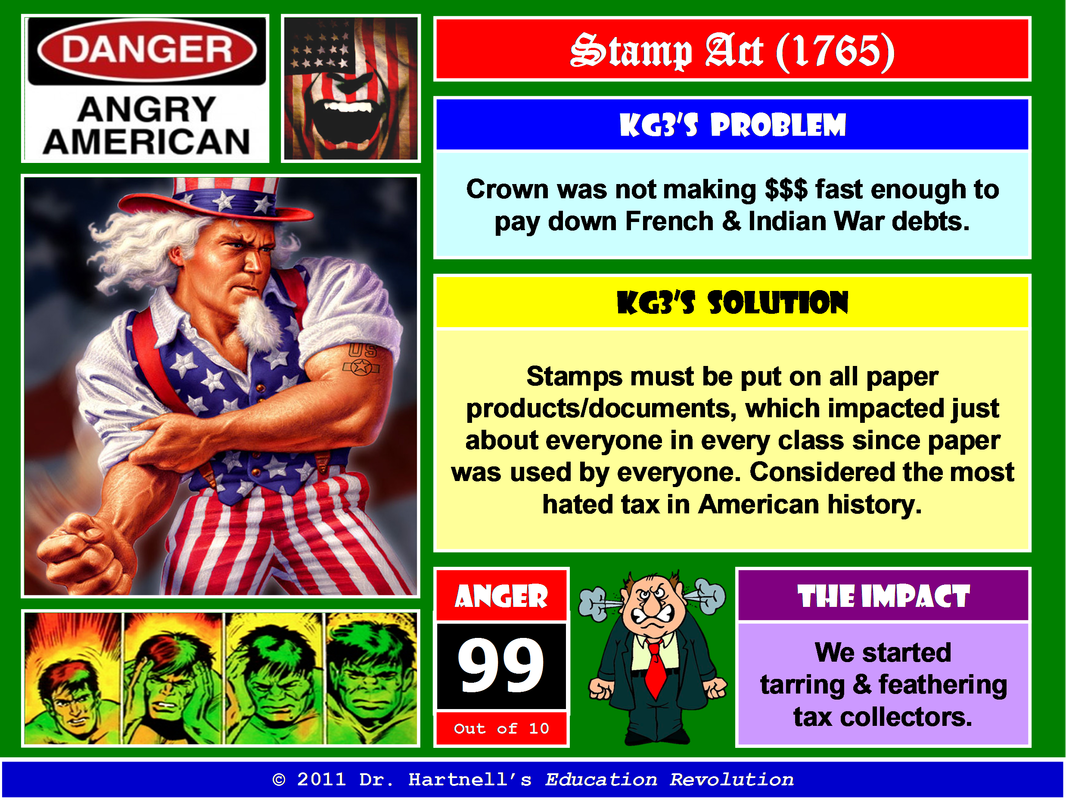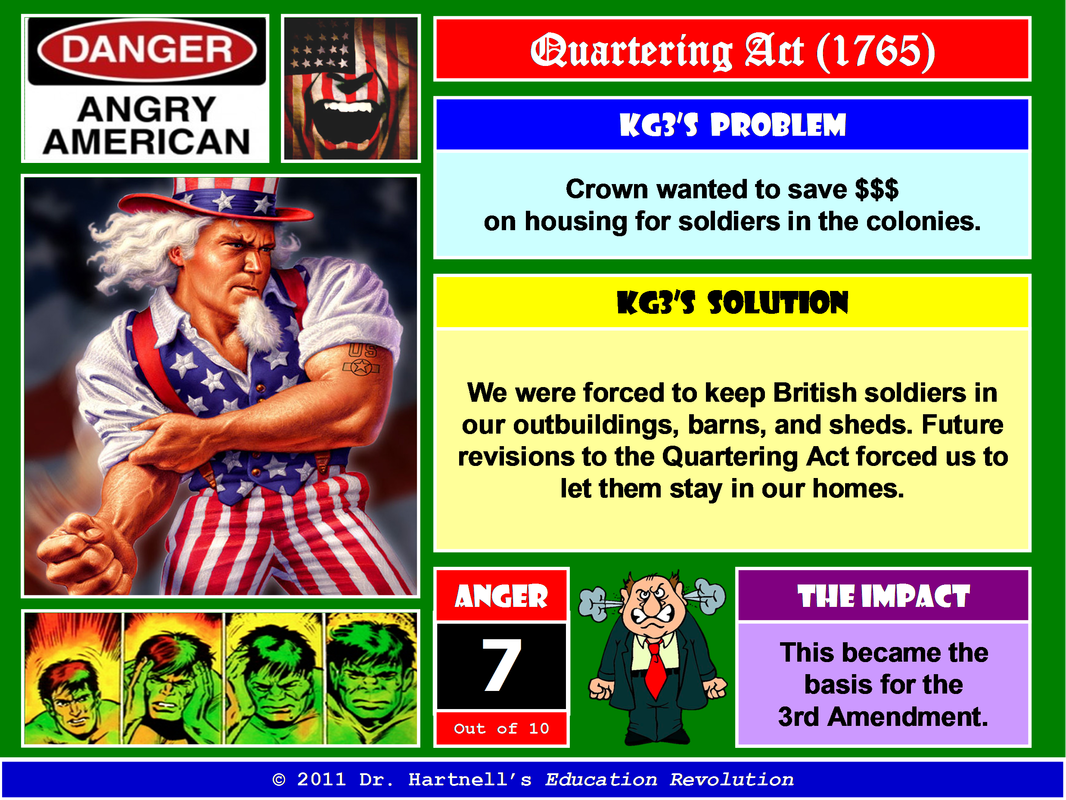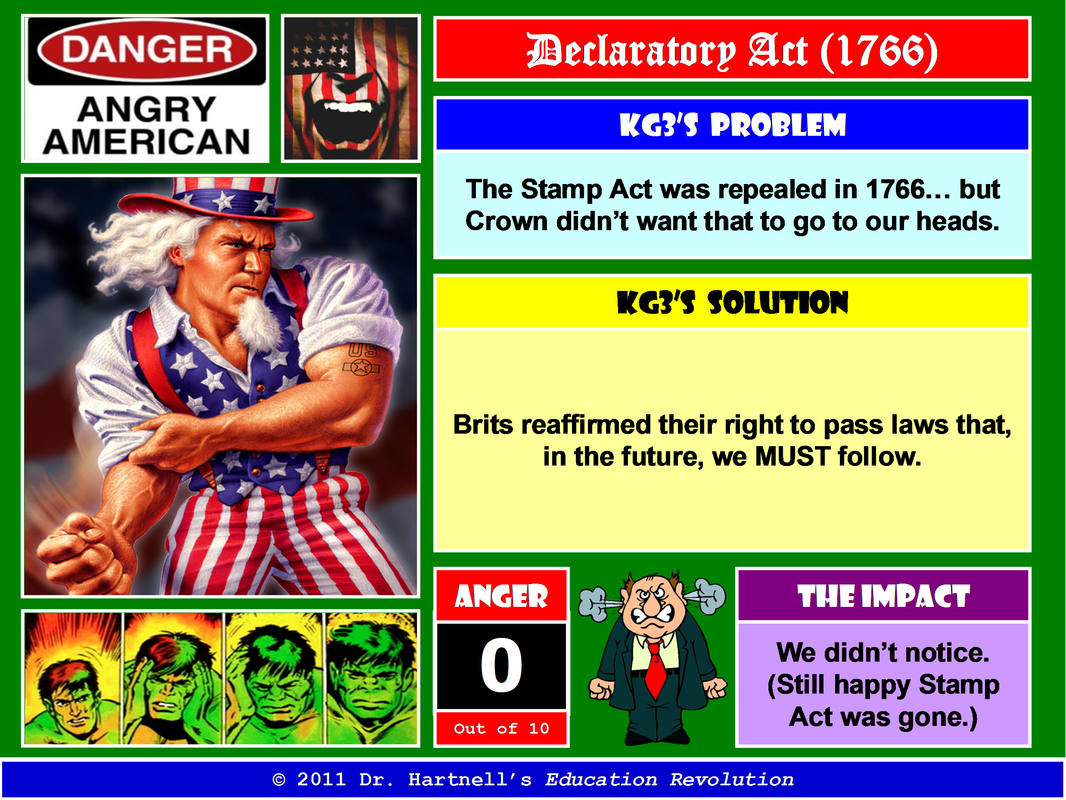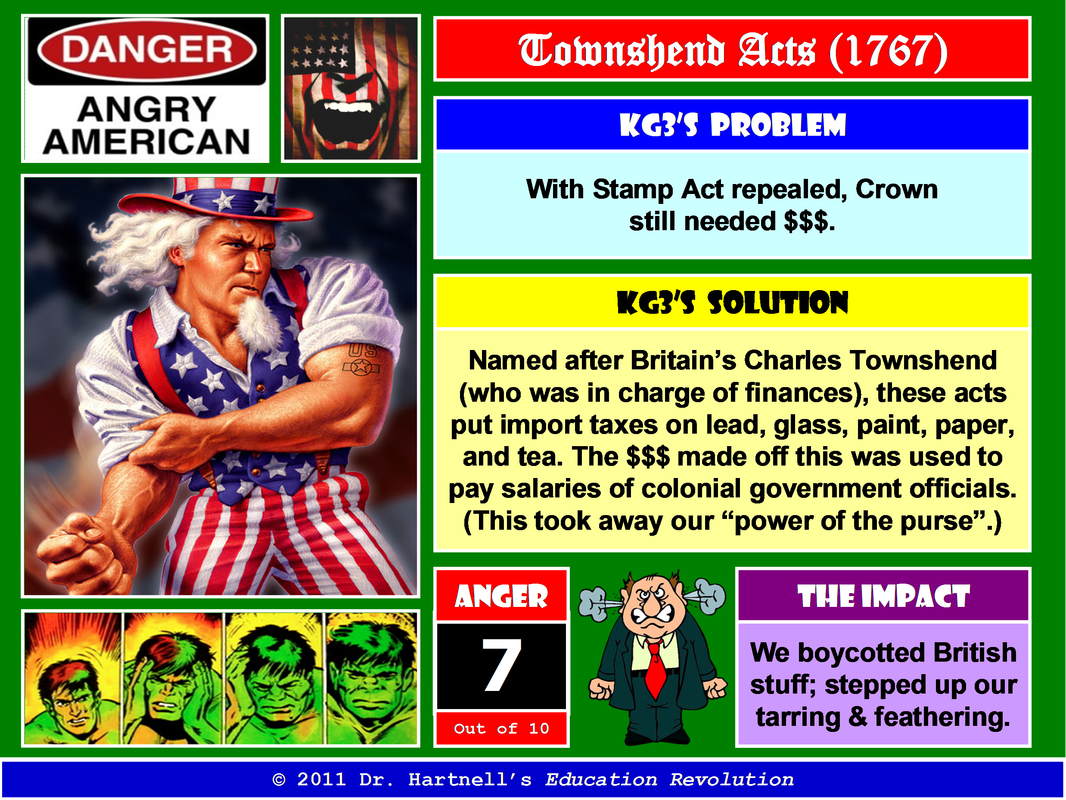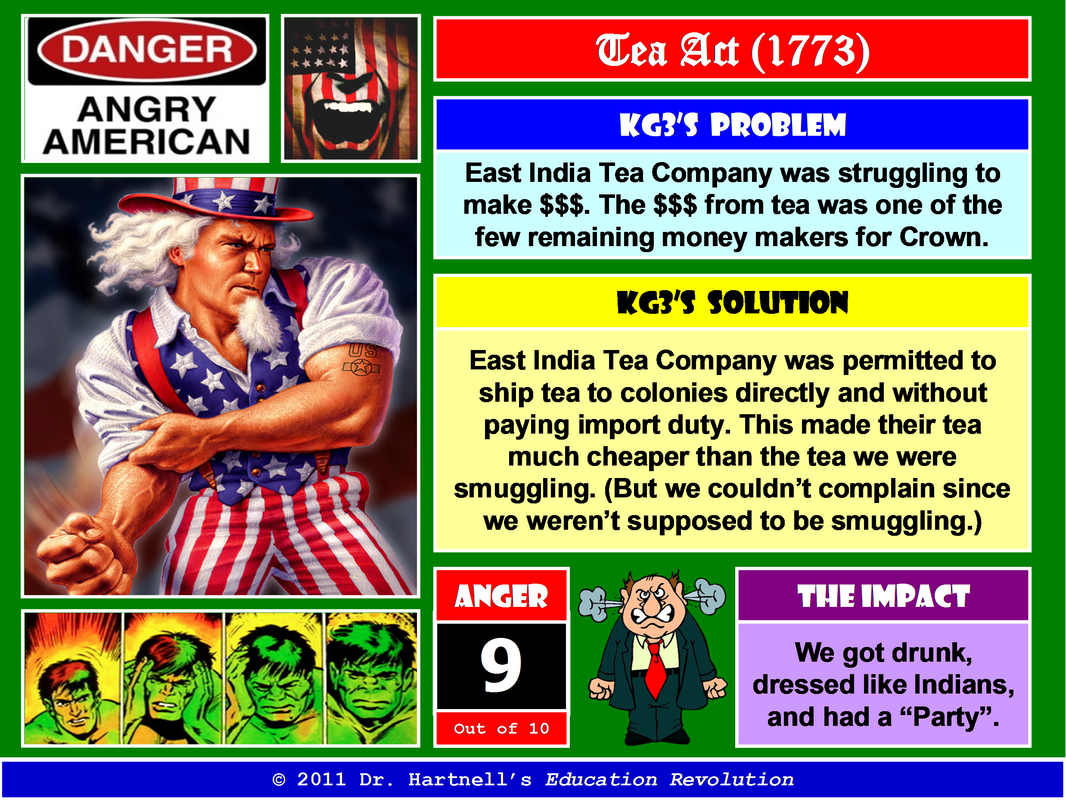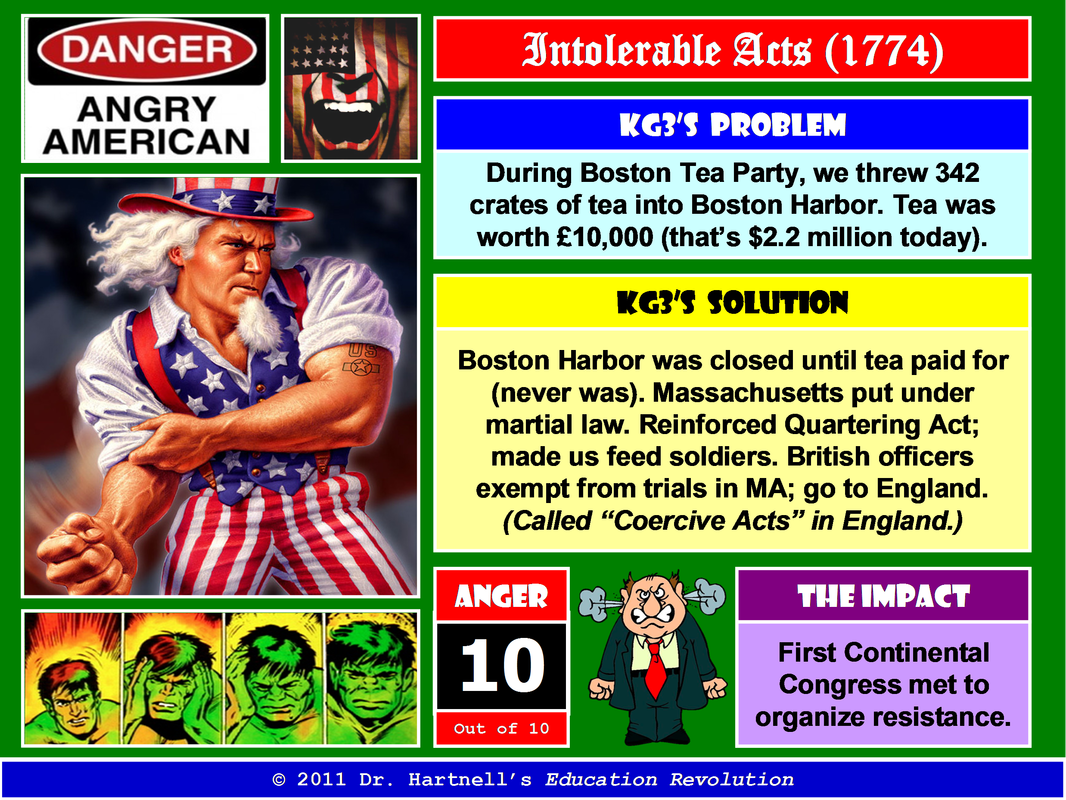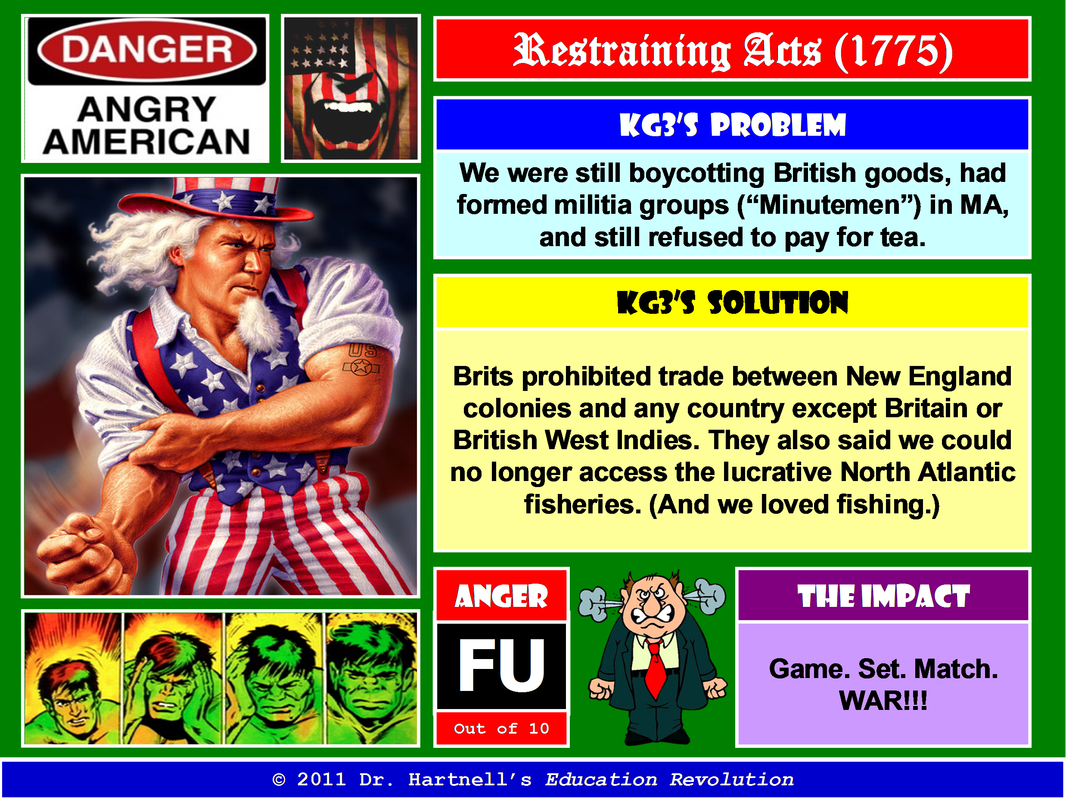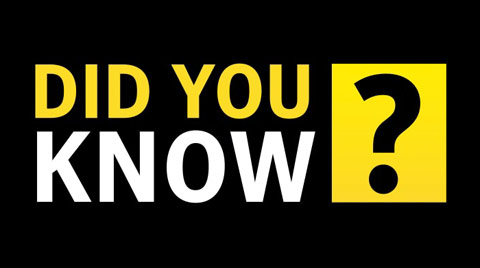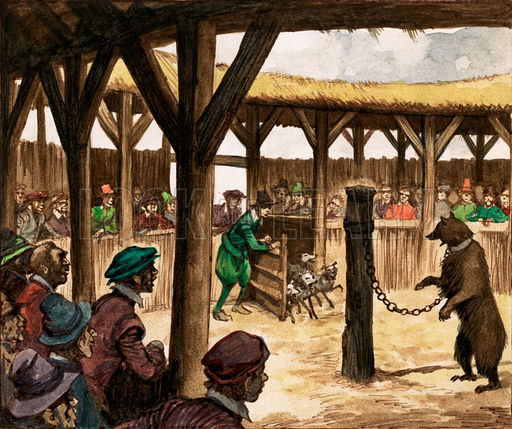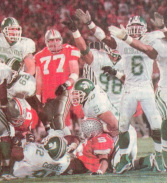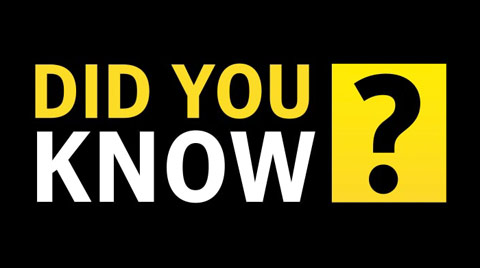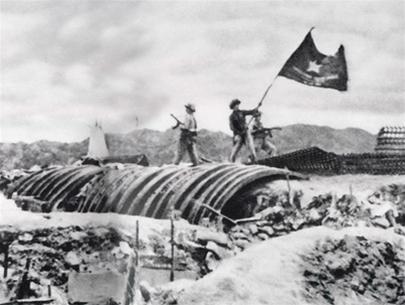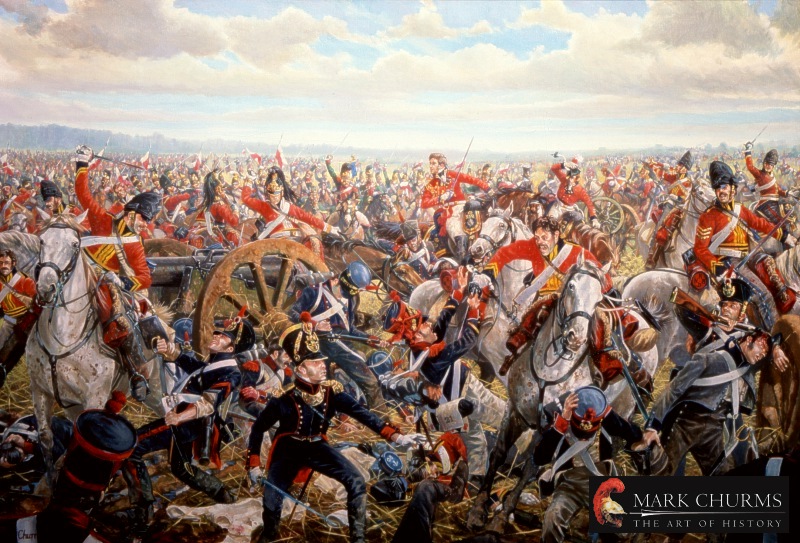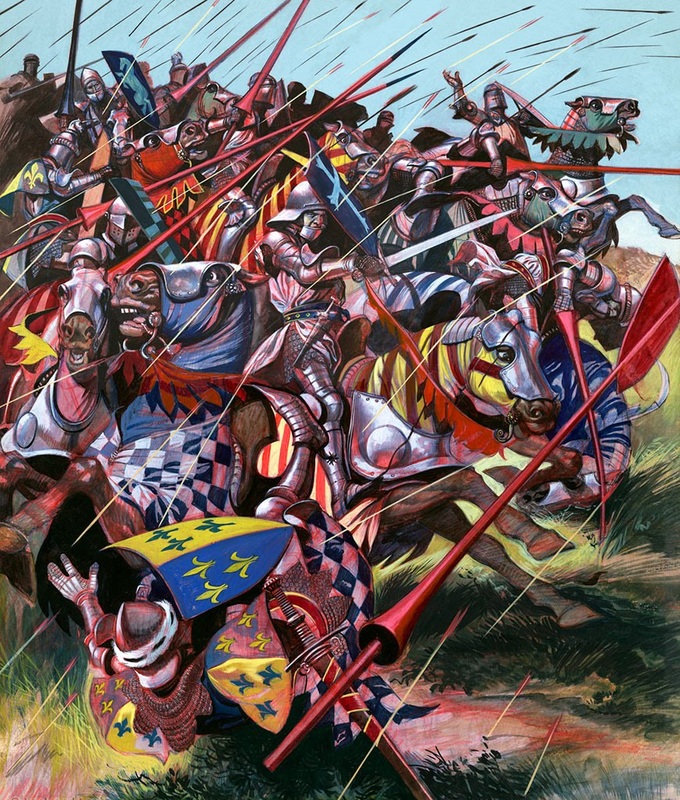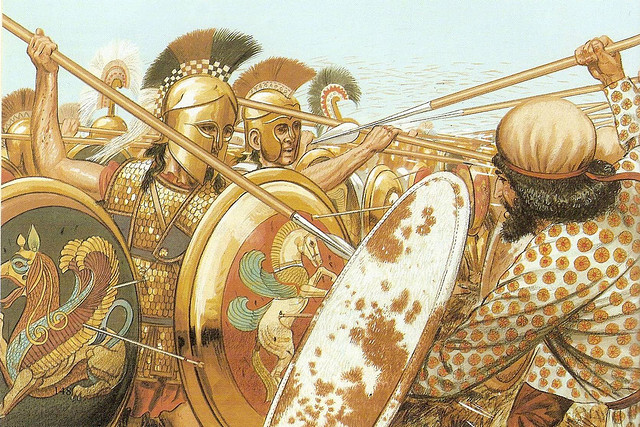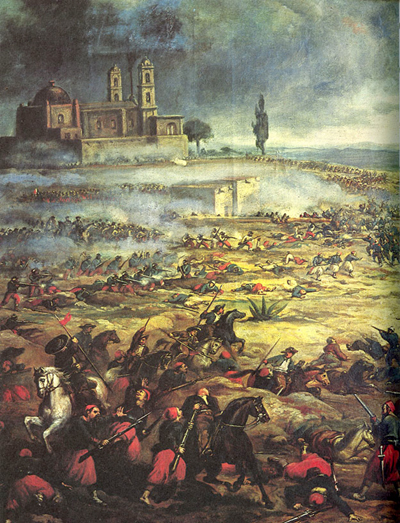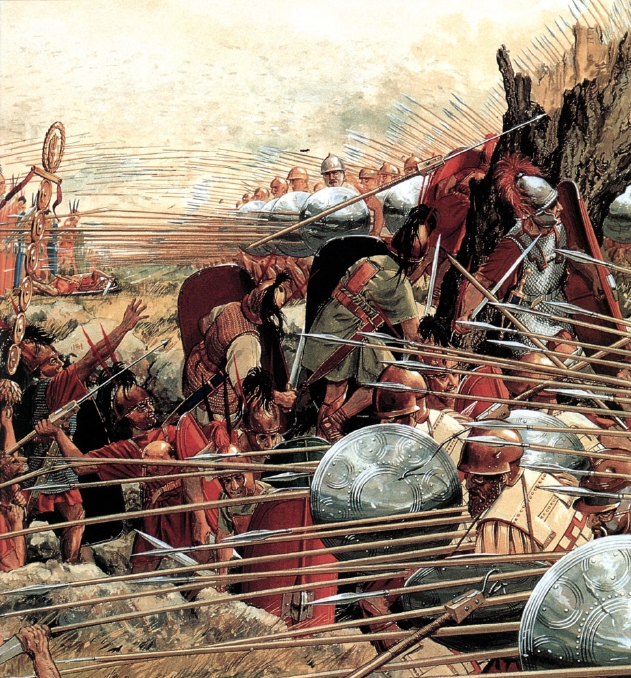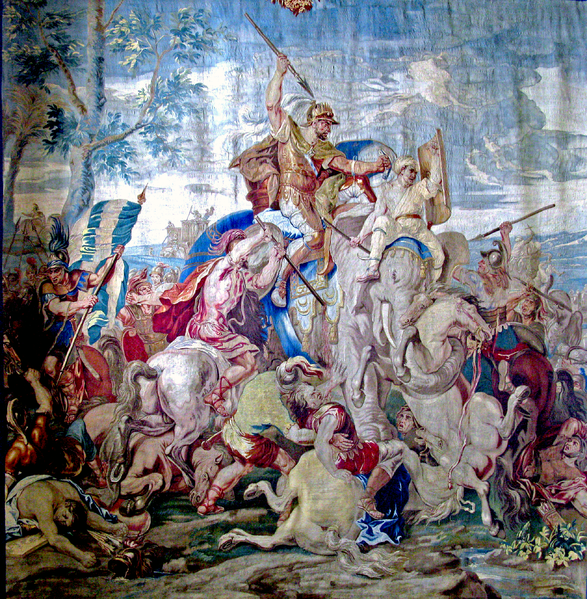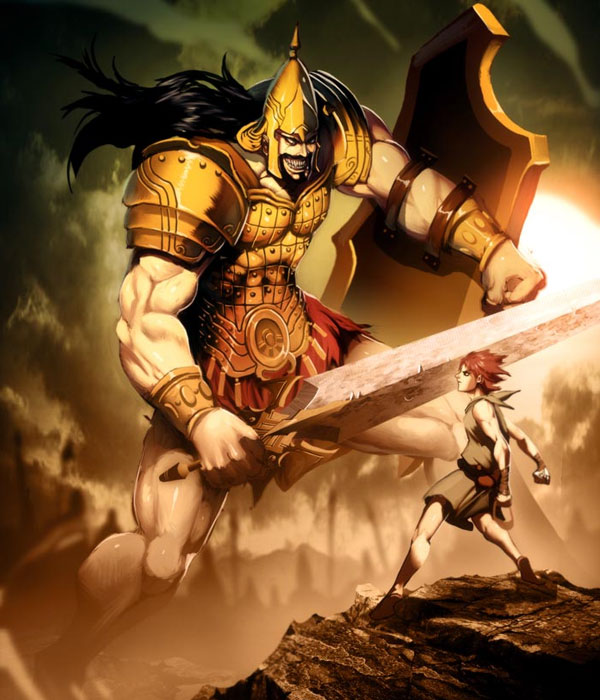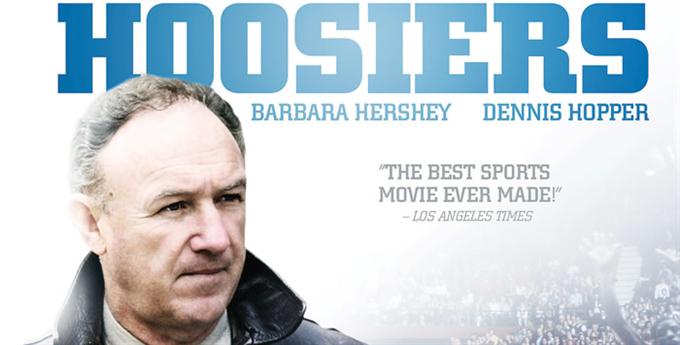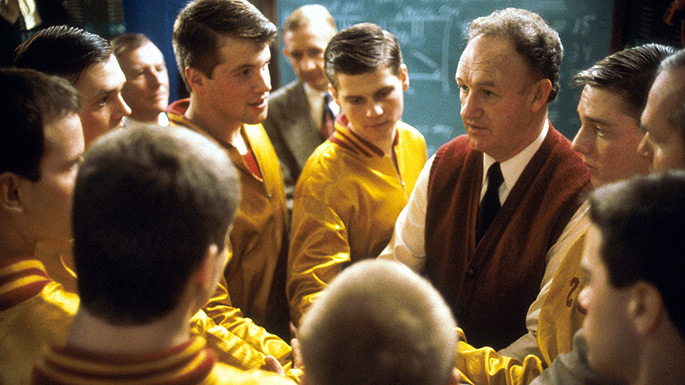Scramblin' thru... American Revolution
Good version...Better version...Best version...Let it Begin Here...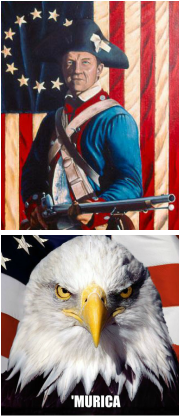
Everyone loves a good underdog. And everyone can find motivation in the "us against the world" anecdotal cliché. Whether it's a scrappy squad filled with no-namers that takes down the #1 team in the land – or it's that passing grade you got in the math class no one thought you should have taken in the first place – the story of the underdog captures our collective national attention. And, truth-be-told, nothing epitomizes the original underdog story quite like the group of rag-tag farmers that stood toe-to-toe with the greatest military force ever assembled in world history.
American History 101The American Revolution was a conflict between the 13 British colonies in North America and their mother country, Great Britain. It was made up of two key events: the American War of Independence (1775-1783) and the penning of the Constitution in 1787 that made the new nation a republic in which power resided with the people.
Where Ya Been, Mom?Just like any "Coming of Age" tale, the American Revolution is about a son drifting apart from his mother. The instinctual bond once cemented in allegiance slowly eroded over the year as the colonies found themselves neglected and ignored. (We didn't necessarily dislike this salutary neglect, but we did miss the birthday cards.)
As settlers set up their American colonies, a major political and religious conflict began in 1640 in England. During this English Revolution (1640-1660), an armed uprising resulted in the execution of King Charles I and the establishment of the Commonwealth led by Oliver Cromwell, a Puritan and military hero of the rebellion. During these two decades of political strife in England, the existing colonies governed themselves and established their own representative institutions. Several colonies even elected their own governors. (Yes, we were getting "all growed up".) By 1660, the government run by Cromwell had collapsed. With the end of the Commonwealth, England returned to a monarchy and placed Charles I's son, Charles II, back on the throne... since they had no choice after killing their last king. This began the English Restoration (1660-1685). Prior to Charles II, England had lacked a coherent colonial policy, which resulted in it creating and governing its colonies in a haphazard fashion. Although Charles II continued some of the old policies of colonialism, he tried to take back control of the very lucrative American colonies by implementing the economic policy known as mercantilism. Mercantilism is a system where colonies are established for the sole purpose of supplying the mother country with materials and markets. Essentially, you create yourself a "go-to" colony that can be used for your gain. (In other words, mercantilism is Twitter. I mean, you created an account because you think you have important things to say... and so you can create "followers".)
To implement mercantilism, England passed legislation called the Navigation Acts that made their colonies trade only with the mother country. The acts also required that stuff imported or exported by English colonies in Africa, Asia, or America had to be shipped on English boats. (It's called "job security" for English shipbuilders...) Coming off of decades of salutary neglect (and missed birthdays), the American colonists were a little peeved at this move. And that, they say, is where the "plot thickens"... Britain vs. France... AGAIN!For the umpteenth time, Britain and France would wage war. Despite neglecting its American empire for some time, England was shocked to find its colonists trading (and cavorting) with... Frenchies!
While Britain is away, the French will play. Is it England... or Britain?Wait... you just called England "Britain". Which is it?
Dr. Hartnell is glad you asked... the Act of Union in 1707 took the countries of England, Scotland, and Wales and created the "Kingdom of Great Britain", a term derived from the name used to describe the entire island. In 1801, the Kingdom of Great Britain was merged with the Kingdom of Ireland to form the "United Kingdom of Great Britain and Ireland". From 1919-1921, the Irish War of Independence was fought. Finally, in December 1922, 26 of Ireland's counties exited from the United Kingdom of Great Britain and Ireland and formed the independent "Irish Free State". Six counties, called Northern Ireland, remained in the United Kingdom, which was renamed the "United Kingdom of Great Britain and Northern Ireland" in 1927. For simplicity's sake, however, throughout the remainder of this unit, Dr. Hartnell will use the term "British" to refer to the Kingdom of Great Britain and use the term "England" or "English" when referencing the time period prior to the merger in 1707. Aren't you glad you asked? During England's absence – HA! I mean Britain's absence (just seeing if you're paying attention), France built a slew of settlements from Québec to New Orleans and made trading agreements with Native Americans. The French trading empire impeded the expansion of British settlements, and the strength of the French and their Native American allies was a constant concern. As a result, the British and French fought frequently: in King William's War (1689-1697), in Queen Anne's War (1702-1713), in King George's War (1744-1748), and in the French and Indian War (1754-1763). In all of these wars, the French had the assistance of most of the Native American tribes while Britain played the "Mom Card" and guilted America into fighting for her.
But Britain wasn't about to lose to the French, so they threw every resource into these conflicts... proving that in order to fix a problem, sometimes you do have to throw money at it. Of course, when you run out of money and have to start raiding your kid's piggy bank, that's when the whole "trust" issue has a tendency to crumble.
Keep in mind that fighting wars on continents that are 3,000 miles away using soldiers that are waaaaay overdressed and arming them with horrifically inaccurate weapons that require a LOT of ammunition is (a) ridiculous and (b) crazy expensive, there's no wonder that Britain's debt jumped from £72,289,673 before the war to £129,586,789 after the war. (And since most of us have no idea what that weird "L" symbol is... and even if Dr. Hartnell told you it means "pound" you would think of "lbs." and not the British form of currency... let's translate this: Momma was broke.) Raiding the Piggy BankThe interest alone on Britain's debt required half of the government's revenues... the overtaxed people in Britain could not be asked to pay any more... the American colonists, essentially, just doubled their playground with all the new land they got with France gone... soooooo, Mom busted out the "As long as you live under my roof" card and asked her kids to pay for the war.
Because this is a family-used website, Dr. Hartnell won't type what the colonists initially said... As such, from the end of the French and Indian War until shots were fired in Lexington in 1775, relations between Britain and the colonies slowly degenerating into a glorified peeing contest. Both sides were to blame, really. Britain would pass a ridiculous tax knowing full well it would fire up the colonists. Like a disobedient child holding his breath in the checkout line of the grocery store, the colonists would form committees, get drunk, and make awful decisions. (Seriously, America? Explain to me how chucking snowballs at armed soldiers and daring them to "fire" could possibly end well? And what part of dressing up like Indians and throwing tea off ships did you think was a good idea? Nothing like destroying $2.2 million of your Mom's personal property to prove a point... and then acting shocked when she flips out.) As it were, Americans weren't so mad at the amount Britain was taxing (one-tenth of one penny was the cost of a stamp under the Stamp Act) as they were mad at the fact Britain thought they had the right to tax the colonies. You Won't Like Me Angry...The following are the 10 biggest acts passed by Britain that made America angry. Bad move.
Britain found out the hard way what happens when it makes Americans angry. While the farmers didn't turn into freakish green monsters with superhuman strength (although that would make for a pretty sweet story), they did unleash absolute hell on the British, who had surmised that this little "rebellion" would be crushed in less than six months (and that's including travel time).
But Dr. Hartnell is going to let the folks at SportsCenter take it from here! Click here or click the picture below to see a SportsCenter "special presentation" on the American Revolution! |
An "underdog" is a person, group, team, politician, etc. that is expected to lose. On the flipside, the counterpart that's expected to win is known as the "top-dog". The use of these terms comes from the barbaric blood-sport of bear-baiting where bears would battle hunting dogs in an arena. (King Henry VIII and Queen Elizabeth I were huge fans of the sport.) The "top-dog" was trained to attack the bear's throat and head while the "underdog" was trained to attack the bear's underside. The top-dog had a better chance of surviving and beating the bear... whereas the underdog was more likely to die.
An "upset" occurs in a competition (like in an election or a sporting event), when the party/team that's supposed to win (called the favorite) is beaten by the underdog. The origin of the word has
mistakenly been attributed to the surprise defeat of the horse Man o' War by a horse named Upset, giving Man o' War the first loss in his career (20-1). While this makes for a good story, the word "upset" had been in use for several decades before Man o' War's defeat in 1919. In fact, the word was first used in 1877. The Top 10 Upsets in the History of Warfare:
Upset #10: The Battle of Dien Bien Phu (1954).
This battle saw the French overwhelmed by Viet Minh forces and ended the First Indochina War (1946-1954) in French defeat. While the Viet Minh had a massive numerical advantage over the French (63,000 to 10,800), and despite suffering 23,000 casualties, it should have never come to this in the first place. France had the upper hand in terms of military power and technology but fell prey to guerilla warfare and outmaneuvering. The defeat paved the way for American involvement in the Second Indochina War (1955-1975), better known in the U.S. as the Vietnam War (1964-1973). Upset #9: The Battle of Waterloo (1815).
French Emperor Napoleon Bonaparte returned from exile in 1815. His return resulted in the formation of a coalition of countries (namely Britain and Prussia) that met, and defeated him, in Waterloo, Belgium. So complete was Napoleon's defeat that the phrase "met their Waterloo" means unexpectedly losing something you were certain you would win. Napoleon's defeat ended his 100-day return from exile, and he was exiled again... this time for good. Upset #8: The Battle of Agincourt (1415).
Despite massive victories at the Battles of Crécy and Poitiers, the English longbowmen were still heavy underdogs against the French knights during the Hundred Years' War (1337-1453). This was due to the sheer numbers the English were up against (some accounts put it at 6,000 longbowmen vs. 36,000 knights). Whatever the case, the longbowmen mowed down their enemies (literally), killing 9,000 knights while suffering only 400 KIA themselves. (Other historians say the English KIA was as low as 112 to France's 10,000.) The battle ushered in a new era of warfare, showing that the knights' "old school" ways of fighting were over. Upset #7: The Battle of Marathon (490 BC).
When you think of Ancient Greece... and you think of warriors... you probably think of the Spartans. Rarely do you think of philosophical and democratic Athens fielding a fighting force. Neither did Persia. The Persian defeat at Marathon (where they outnumbered the Greeks 360,000 to 9,000) was so huge that it ended their first invasion of Greece and showed the Greeks that the Persians were not invincible. And while Persia returned for a second disastrous invasion (with epic battles at Thermopylae, Salamis, and Plataea), Marathon marked the beginning of the end of the once mighty Persian Empire. Upset #6: The Battle of Puebla (1862).
Who doesn't love Cinco de Mayo?! Well, here's why it's even celebrated in the first place... the smaller armies of Mexico held off an invasion of French forces during a war that France wound up winning. Yes, Mexico celebrates winning a battle in a war it eventually lost! Bueno! (And NO, it's NOT Mexico's Independence Day, so scold whatever Spanish teacher told you that...) Still, the French occupation of Mexico - and their subsequent withdrawal - screwed up whatever political stability Mexico actually had, forever condemning our friends "south of the border" to perpetual chaos and turmoil. Thanks, France! Upset #5: The First Battle of Bull Run (1861).
Stop me if you've heard this one before: one side declares that it'll win a war in a matter of weeks or months... and then has its butt kicked up and down the battlefield. Case in point: Bull Run, the first land battle of the U.S. Civil War (1861-1865). So confident of victory was the Union that picnickers showed up to watch them crush this little Southern rebellion. The First Battle of Bull Run (or First Manassas if you're from the South) wound up being the largest and bloodiest battle in American history up to that point. The Northern public was so shocked at the unexpected defeat of their army that they quickly realized the war would be longer and more brutal than they had imagined. They were right. It remains, today, the deadliest war ever waged by Americans. (Of course, when every person that gets shot by Americans are, well, Americans... the numbers have a tendency to be a bit skewed...) 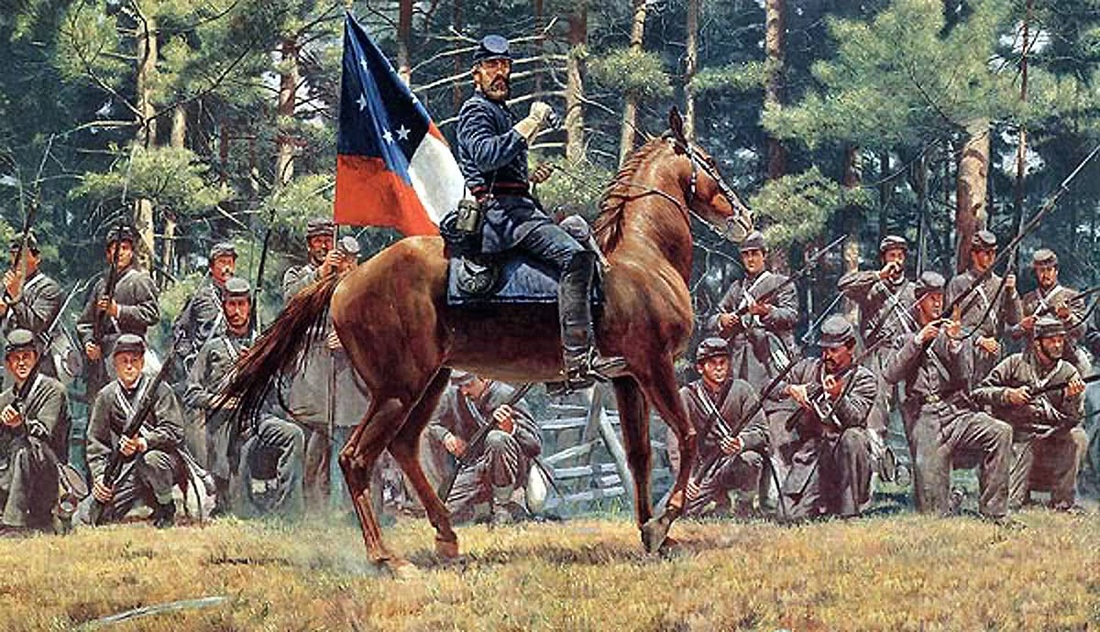
Bull Run made a legend out of a relatively unknown colonel named Thomas J. Jackson... better known as "Stonewall" Jackson. For refusing to give up his ground, observers wrote: "There is Jackson standing like a stone wall." The rest was history... or at least until he was accidently shot and killed by his own troops. D'oh! [Click picture for a larger version.]
Upset #4: The Battle of Yorktown (1861).
Talk about a classic upset. British General Charles Cornwallis hadn't lost a battle. Sure he had a few "draws", but his record was spotless. Until Yorktown. In a series of missteps, Cornwallis found himself trapped in Virginia... and surrounded by the Patriot Army of George Washington (who had managed to sneak out of the north) and Britain's nemesis France that bottled them up off the coast. The battle/siege ended when Cornwallis surrendered over 7,500 British soldiers, effectively ending his "win-streak" and the North American phase of the American Revolution (1775-1783). Talk about a bad time to lose... for him. Not us. We were juuuust fine with him losing. Not too shabby for a bunch of farmers! 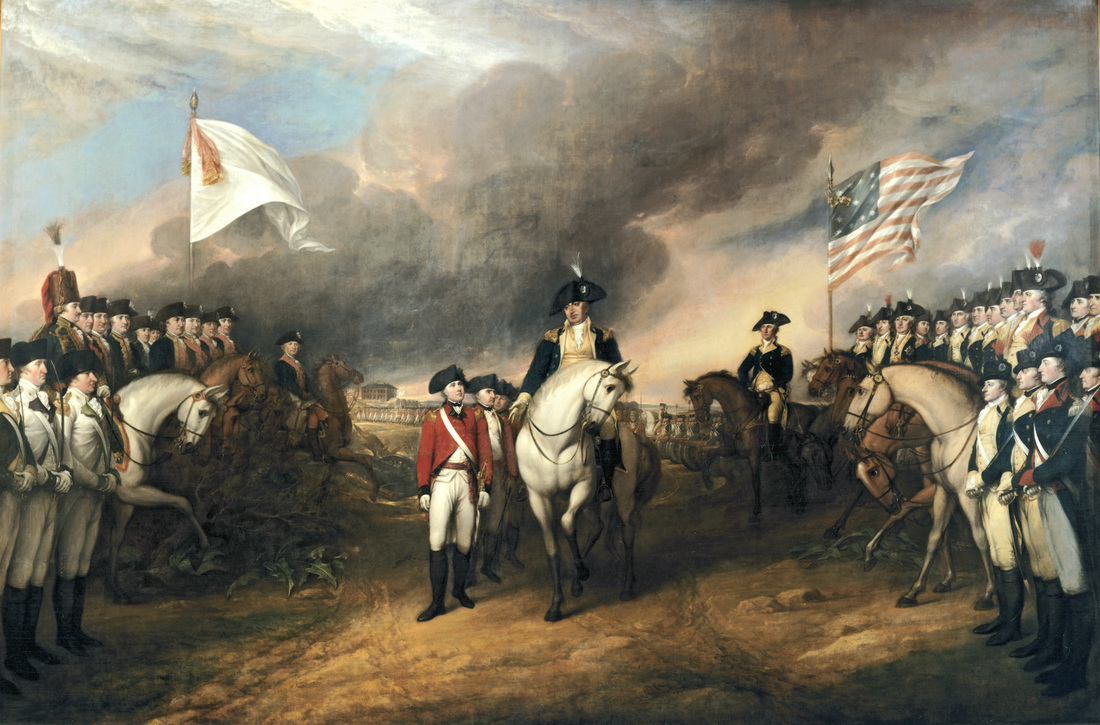
As the story goes, Cornwallis was too embarrassed to surrender his sword, so he sent a subordinate. When that British officer walked up to Washington, Washington coolly refused and had his own subordinate, Benjamin Lincoln, accept the British surrender. That's right. Washington "went there". [Click picture for a larger version.]
Upset #3: Battle of Cannae (216 BC).
While a bunch of upsets by the Vietnamese, Mexicans, Confederates, and farmers might impress you... if you really want to send shock waves around the globe, you gotta bring in the elephants. Yes, indeed. The Second Punic War (218-201 BC) had the makings of the ultimate underdog story. A general named Hannibal from Carthage (located in Northern Africa) led his army - complete with giant war elephants - through the Alps and attacked the greatest empire at the time... Rome. As fate would have it, the two forces collided in Cannae in Southeast Italy. Being outnumbered 86,400 to 50,000 didn't phase Hannibal, who quickly achieved one of the greatest tactical feats in military history and handed mighty Rome one of its greatest defeats... ever. Final tally: Rome lost 77,700 killed or wounded and 4,500 capture. Only 4,200 Romans lived through this battle... of the 86,400 that were there. Of course, Rome went on to win the Punic Wars, burnt Carthage to the ground, plowed the city under, and salted the earth so nothing could ever grow there again. (You mad, bro?) Upset #2: Battle of Gaugamela (331 BC).
When it comes to "game changers", look no further than Alexander the Great. His overwhelming defeat of King Darius III and his Persian Army at the Battle of Gaugamela (on October 1st... Dr. Hartnell's birthday no doubt) upset the established order by ending the Persian Empire. This paved the way for the creation of the world's largest empire (at that time) that stretched from Greece to Persia to Egypt to India. Alex's empire lasted until his death in 323 BC but his spread of Hellenistic culture (that blended Greek, Persian, Egyptian, and Indian culture) lasted an eternity... at least until the Internet was invented... Upset #1: David beats Goliath (1025 BC)
Ah yes, the one that started it all. According to "1 Samuel 17" in the Bible, David (the future king of Israel) killed the giant Philistine warrior Goliath by striking him in either the forehead or the temple (accounts vary) with a stone he flung from a sling. Some Biblical historians argue that David struck Goliath in the leg, which prompted the giant to fall to the ground and gave David time to behead him before he could get up. Historians also debate Goliath's "giant" height, placing him somewhere between 6'9" and 9'9". Now, 6'9" was tall for a time period when the average male height was 5'3". Of course, 9'9" is Yao Ming. And that's just stupid tall. Still, whatever his height, David dropped him faster than Dr. Hartnell dropped 3rd period French class. And from this victory came the generic (and over-used) sports analogy of "a David beating a Goliath". You're welcome... every tiny school that's overcome the impossible, defied the odds, never-said-never, dug-down-deep, dared to dream, and killed a giant. |
The movie "Hoosiers" came out in 1986 and is about a small-town Indiana high school basketball team (named Hickory) that wins the state championship in 1952. It is loosely based on the Milan High School team that won Indiana's 1954 state championship. As Dr. Hartnell's favorite sports movie of all time, it should be viewed by anyone who ever wants to play or coach the greatest sport ever made. In fact, watch it twice. In a row.

